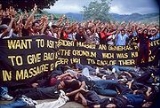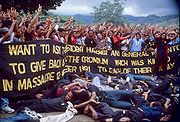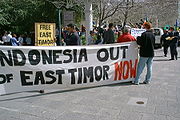
East Timor and Indonesia Action Network
Encyclopedia
The East Timor and Indonesia Action Network (ETAN) is a nonprofit US organization supporting human rights
throughout Southeast Asia
and Oceania
. ETAN was founded in 1991 to support the right to self-determination of Timor-Leste. In 2001, that goal was significantly realized when the people of East Timor voted for independence. Since then ETAN has focused on building on its success in support of justice and self-determination in Timor-Leste and the surrounding region.
 The human rights
The human rights
organization ETAN has a 15-year record of successful advocacy for the people of Timor-Leste and Indonesia.
From the ETAN website: "The East Timor and Indonesia Action Network (ETAN) was founded in November 1991 to support genuine self-determination and human rights for the people of East Timor in accordance with the Universal Declaration of Human Rights
, the 1960 United Nations General Assembly Resolution on Decolonization, and Security Council and General Assembly resolutions on East Timor."
Trade with Portugal began in the early 16th C. Timor's colonial history lasted over 400 years, from the Portuguese colonization of the mid-16th C., to 1975 - Imperial Japan having briefly occupied East Timor from 1942 to 1945. East Timor declared itself independent from Portugal on 28 November 1975.
On 30 August 1999, in a UN-sponsored referendum, East Timor voted, by an overwhelming majority, for independence from Indonesia. Again, immediately following a vote for independence, violence was used to quash the democratic process of independence. Militias organised and supported by the Indonesian military commenced a scorched-earth campaign, killing approximately 1,400 Timorese and displacing 300,000 people to West Timor, and destroying the country's infrastructure. The International Force for East Timor (INTERFET) was deployed to the country and brought the violence to an end. The United Nations took over administration for a transition period, establishing the Truth and Reconciliation Commission
to investigate events of the occupation period. East Timor was internationally recognised as an independent state in 2002.
Whereas Indonesia invaded East Timor by force, another form of occupation was bequeathed to Indonesia by the borders established by occupying imperial forces when they left Papua New Guinea
. It remains split into the western provinces, Papua
and West Papua, occupied by Indonesia and recognized by the world community as part of Indonesia, and Papua New Guinea 'proper'. Timor thus has resistance to Indonesian occupation in common with New Guinea.
was attacked by 200 soldiers, killing over 250 funeral goers, in what was later called the Dili Massacre, or Santa Cruz massacre, on 12 November 1991. Although it was only one of many incidents of violence committed by the Indonesian military, and one of four mass killings - the other three being at Quelicai, Lacluta, and Kraras - its scale, timing, and press coverage made it a rallying cry for the independence movement and created supporters abroad. It politicized many, and galvanized pro-independence East Timorese. A burgeoning East Timor solidarity movement grew in Portugal, Australia, and the United States. US ties with Indonesia were cut in 1991 and further in 1999, and not restored until 2005.

In spring of 2007, East Timor held its first national elections since independence
; civic groups in East Timor, seeking help in monitoring the election process, requested aid from ETAN, which formed the Solidarity Observer Mission for East Timor (SOMET)Observer Project in response.
The 2005 bilateral Indonesia – Timor Leste Commission of Truth and Friendship, sponsored by the UN, in 2008 released its findings on what it called Indonesia's "organized campaign of violence" and "gross human rights violations in the form of crimes against humanity." ETAN welcomed Indonesian president Susilo Bambang Yudhoyono
's acknowledgement of the facts uncovered by the commission, but pointed out that there have been no repercussions for any Indonesian officials to redress what the commission called "institutional responsibility".
ETAN opposed president-elect Obama's proposed appointment of Admiral Dennis C. Blair for Director of National Intelligence, saying "His actions demonstrate the failure of engagement to temper the Indonesian military’s behavior and his actions helped to reinforce impunity for senior Indonesian officials that continues to this day" Blair met with General Wiranto in Jakarta in April 1999, less than a week after displaced people taking refuge in a church were killed with machetes by militia members backed by the Indonesian military.
ETAN addresses a wide range of concerns, including US policy in the Southeast Asia / Oceania region, oil and gas exploitation, reparations and accountability for past and present human rights violations. It supports the rights of the West Papuan people and the independence of West Papua from Indonesia.
ETAN is opposed to the oil and gas deal: Treaty on Certain Maritime Arrangements in the Timor Sea
(CMATS), in the Greater Sunrise area. US national coordinator for ETAN John Miller wrote the Australian government, saying "Australia has put its own and some oil companies’ short-term financial interests over fundamental principles of democracy, the rule of law, economic justice, and respect for
national sovereignty.", although he also extended an olive branch
by saying "It is true that under CMATS, Timor-Leste will receive a greater share of its resources than...(under)...the International Unitization Agreement."
ETAN eschews a mission statement and slogan. Its original mission was achieved in 2001, and much remains to be achieved in its current scope; its homepage is dedicated to the most recent issues affecting the southeast asian area or the occasional endorsement from political leaders.
Human rights
Human rights are "commonly understood as inalienable fundamental rights to which a person is inherently entitled simply because she or he is a human being." Human rights are thus conceived as universal and egalitarian . These rights may exist as natural rights or as legal rights, in both national...
throughout Southeast Asia
Southeast Asia
Southeast Asia, South-East Asia, South East Asia or Southeastern Asia is a subregion of Asia, consisting of the countries that are geographically south of China, east of India, west of New Guinea and north of Australia. The region lies on the intersection of geological plates, with heavy seismic...
and Oceania
Oceania
Oceania is a region centered on the islands of the tropical Pacific Ocean. Conceptions of what constitutes Oceania range from the coral atolls and volcanic islands of the South Pacific to the entire insular region between Asia and the Americas, including Australasia and the Malay Archipelago...
. ETAN was founded in 1991 to support the right to self-determination of Timor-Leste. In 2001, that goal was significantly realized when the people of East Timor voted for independence. Since then ETAN has focused on building on its success in support of justice and self-determination in Timor-Leste and the surrounding region.
Profile

Human rights
Human rights are "commonly understood as inalienable fundamental rights to which a person is inherently entitled simply because she or he is a human being." Human rights are thus conceived as universal and egalitarian . These rights may exist as natural rights or as legal rights, in both national...
organization ETAN has a 15-year record of successful advocacy for the people of Timor-Leste and Indonesia.
From the ETAN website: "The East Timor and Indonesia Action Network (ETAN) was founded in November 1991 to support genuine self-determination and human rights for the people of East Timor in accordance with the Universal Declaration of Human Rights
Universal Declaration of Human Rights
The Universal Declaration of Human Rights is a declaration adopted by the United Nations General Assembly . The Declaration arose directly from the experience of the Second World War and represents the first global expression of rights to which all human beings are inherently entitled...
, the 1960 United Nations General Assembly Resolution on Decolonization, and Security Council and General Assembly resolutions on East Timor."
Colonial Timor
A small country in Southeast Asia, comprising the eastern half of the island of Timor, the nearby islands of Atauro and Jaco, the country of Timor has a history marked not only by the colonization common to Southeast Asia, but repeated violence against democratic and independence movements.Trade with Portugal began in the early 16th C. Timor's colonial history lasted over 400 years, from the Portuguese colonization of the mid-16th C., to 1975 - Imperial Japan having briefly occupied East Timor from 1942 to 1945. East Timor declared itself independent from Portugal on 28 November 1975.
Indonesian invasion and occupation
Nine days after the 1975 declaration of independence, East Timor was invaded and occupied by Indonesian forces and incorporated into Indonesia. The subsequent occupation (1974–1999) saw an estimated 102,800 conflict-related deaths (approximately 18,600 killings and 84,200 'excess' deaths from hunger and illness).On 30 August 1999, in a UN-sponsored referendum, East Timor voted, by an overwhelming majority, for independence from Indonesia. Again, immediately following a vote for independence, violence was used to quash the democratic process of independence. Militias organised and supported by the Indonesian military commenced a scorched-earth campaign, killing approximately 1,400 Timorese and displacing 300,000 people to West Timor, and destroying the country's infrastructure. The International Force for East Timor (INTERFET) was deployed to the country and brought the violence to an end. The United Nations took over administration for a transition period, establishing the Truth and Reconciliation Commission
Commission for Reception, Truth and Reconciliation in East Timor
The Commission for Reception, Truth and Reconciliation in East Timor was an independent truth commission established in East Timor in 2001 under the UN Transitional Administration in East Timor and charged to “inquire into human rights violations committed...
to investigate events of the occupation period. East Timor was internationally recognised as an independent state in 2002.
Whereas Indonesia invaded East Timor by force, another form of occupation was bequeathed to Indonesia by the borders established by occupying imperial forces when they left Papua New Guinea
Papua New Guinea
Papua New Guinea , officially the Independent State of Papua New Guinea, is a country in Oceania, occupying the eastern half of the island of New Guinea and numerous offshore islands...
. It remains split into the western provinces, Papua
Papua
Papua was the name, as provided to the Portuguese commander Jorge de Meneses while sheltering there in 1526, of the people living on Waigeo, one of the Raja Ampat Islands west of the Vogelkop Peninsula, now part of the West Papua province of Indonesia. The Spanish pilot Martin de Uriarte in the...
and West Papua, occupied by Indonesia and recognized by the world community as part of Indonesia, and Papua New Guinea 'proper'. Timor thus has resistance to Indonesian occupation in common with New Guinea.
Dili Massacre
A crowd of several thousand on its way from a memorial service to a nearby graveyardGraveyard
A graveyard is any place set aside for long-term burial of the dead, with or without monuments such as headstones...
was attacked by 200 soldiers, killing over 250 funeral goers, in what was later called the Dili Massacre, or Santa Cruz massacre, on 12 November 1991. Although it was only one of many incidents of violence committed by the Indonesian military, and one of four mass killings - the other three being at Quelicai, Lacluta, and Kraras - its scale, timing, and press coverage made it a rallying cry for the independence movement and created supporters abroad. It politicized many, and galvanized pro-independence East Timorese. A burgeoning East Timor solidarity movement grew in Portugal, Australia, and the United States. US ties with Indonesia were cut in 1991 and further in 1999, and not restored until 2005.
Formation of ETAN
"ETAN was founded following the November 12 Santa Cruz massacre of more than 270 peaceful protestors in a cemetery in Dili, Timor-Leste. The few western reporters present exposed the brutality of the occupying Indonesian military. ETAN was founded to support Timor-Leste’s right to self-determination and to end U.S. military and political support for the illegal occupation." - ETAN website
Activism work
ETAN has co-produced the West Papua Report with the West Papua Advocacy Team (WPAT)since November 2007.In spring of 2007, East Timor held its first national elections since independence
East Timorese parliamentary election, 2007
A parliamentary election was held in East Timor on 30 June 2007. Although a narrow plurality was achieved by the Revolutionary Front for an Independent East Timor , a coalition involving the next three largest groups formed a government...
; civic groups in East Timor, seeking help in monitoring the election process, requested aid from ETAN, which formed the Solidarity Observer Mission for East Timor (SOMET)Observer Project in response.
Political positions
ETAN has actively supported independence from Indonesia, for the western provinces of New Guinea, since 2007.The 2005 bilateral Indonesia – Timor Leste Commission of Truth and Friendship, sponsored by the UN, in 2008 released its findings on what it called Indonesia's "organized campaign of violence" and "gross human rights violations in the form of crimes against humanity." ETAN welcomed Indonesian president Susilo Bambang Yudhoyono
Susilo Bambang Yudhoyono
Susilo Bambang Yudhoyono AC , is an Indonesian politician and retired Army general officer who has been President of Indonesia since 2004....
's acknowledgement of the facts uncovered by the commission, but pointed out that there have been no repercussions for any Indonesian officials to redress what the commission called "institutional responsibility".
ETAN opposed president-elect Obama's proposed appointment of Admiral Dennis C. Blair for Director of National Intelligence, saying "His actions demonstrate the failure of engagement to temper the Indonesian military’s behavior and his actions helped to reinforce impunity for senior Indonesian officials that continues to this day" Blair met with General Wiranto in Jakarta in April 1999, less than a week after displaced people taking refuge in a church were killed with machetes by militia members backed by the Indonesian military.
ETAN addresses a wide range of concerns, including US policy in the Southeast Asia / Oceania region, oil and gas exploitation, reparations and accountability for past and present human rights violations. It supports the rights of the West Papuan people and the independence of West Papua from Indonesia.
ETAN is opposed to the oil and gas deal: Treaty on Certain Maritime Arrangements in the Timor Sea
Treaty on Certain Maritime Arrangements in the Timor Sea
Officially known as the Treaty between Australia and the Democratic Republic of Timor-Leste on Certain Maritime Arrangements in the Timor Sea , the treaty provides for the equal distribution of revenue derived from the disputed Greater Sunrise oil and gas field between Australia and East Timor...
(CMATS), in the Greater Sunrise area. US national coordinator for ETAN John Miller wrote the Australian government, saying "Australia has put its own and some oil companies’ short-term financial interests over fundamental principles of democracy, the rule of law, economic justice, and respect for
national sovereignty.", although he also extended an olive branch
Olive branch
The olive branch in Western culture, derived from the customs of Ancient Greece, symbolizes peace or victory and was worn by brides.-Ancient Greece and Rome:...
by saying "It is true that under CMATS, Timor-Leste will receive a greater share of its resources than...(under)...the International Unitization Agreement."
ETAN eschews a mission statement and slogan. Its original mission was achieved in 2001, and much remains to be achieved in its current scope; its homepage is dedicated to the most recent issues affecting the southeast asian area or the occasional endorsement from political leaders.
Campaigning
ETAN is a non-profit organization which receives donations from the public. Based in the United States, its supporters campaign worldwide.- Between 1991 and 1995 the East Timor Action Network expanded from a tiny handful of people dispersed around the country to a dozen local chapters, doubling again in size over the next four years to include more than 10,000 supporters and a core of several dozen committed activists. In addition to establishing credibility in the progressive and human rights community, ETAN established a reputation as a reliable source of information for journalists, scholars, policymakers, and NGO activists. - Solidarity in an Age of Globalization: The Transnational Movement for East Timor and U.S. Foreign Policy, by Brad Simpson. Peace and Change, Vol. 29, No. 3&4, July 2004
See also
- Free Papua MovementFree Papua MovementThe Free Papua Movement is a militant organisation established in 1965 to encourage and effect the violent overthrow of the current governments in the Papua and West Papua provinces of Indonesia, formerly known as Irian Jaya to secede from Indonesia, and to reject economic development and...
- National Committee for West PapuaNational Committee for West PapuaThe National Committee for West Papua is a Papuan peoples' group campaigning for independence of Papua and West Papua....
- Benny WendaBenny WendaBenny Wenda is a West Papuan tribal leader and an international lobbyist for the independence of West Papua from Indonesia. He lives in exile in the United Kingdom...
- Papuan activist
Further reading
- East Timor and the international community: basic documents; Heike Krieger. 1997, Cambridge University PressCambridge University PressCambridge University Press is the publishing business of the University of Cambridge. Granted letters patent by Henry VIII in 1534, it is the world's oldest publishing house, and the second largest university press in the world...
- Complicity: human rights and Canadian foreign policy : the case of East Timor; Sharon Scharfe, Elaine Briére
- East Timor:beyond independence Damien Kingsbury, Michael Leach, Monash University Press, 2007

